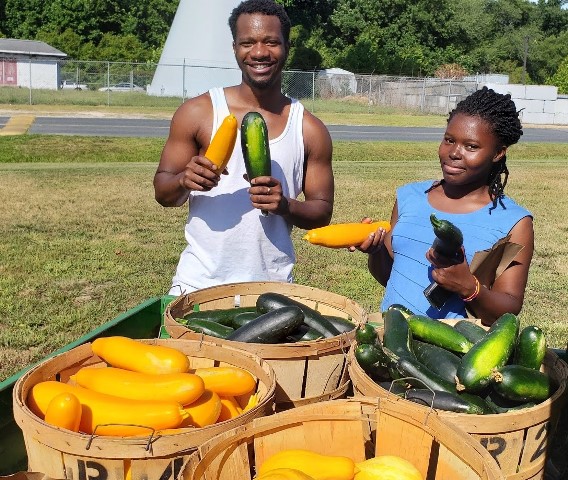UMES research project focuses on managing insects
Wednesday, August 15, 2018
The day may not be too far off when melons will grow in the same field alongside summer squash and zinnias.
Dr. Simon Zebelo, an agriculture research professor who specializes in entomology, and his graduate student Ebony Jenkins are field testing an environmentally friendly pollination strategy to attract helpful insects while distracting pesky counterparts. The goal is bolstering the yield of cash crops like watermelons.
The duo calls it “trap crops.”
No insects are being harmed in the Zebelo-Jenkins project – merely manipulated.
“I used to think I wanted to eradicate all insects,” said Jenkins, who grew up in Snow Hill. “Now, I know it’s not possible.”
The trap crop theory goes like this: surround a plot of watermelons with cucurbit cousins – summer squash and zucchini, vine plants with much larger flowers.
Jenkins and Zebelo watch to see if insects that feast on melon plants are instead distracted by squash and zucchini counterparts.
One of the side benefits has been an impressive yield of edible gourds the size of small footballs. Jenkins makes the weekly harvest available at no charge to grateful UMES employees.
In addition to measuring whether natural methods will divert insects that can devastate cash crops, Zebelo and Jenkins are looking at the role zinnias, sunflowers and other annuals might also play in their research.
They’re hopeful finding the right combination of flowers and trap crops growing side-by-side will nurture the native bee population, which many scientists worry is in precipitous decline.

Zebelo, who joined the UMES faculty from Auburn University three years ago, said his experiment includes plantings that rely on the traditional use of beehives to augment pollination as well as other plots with no hives, just adjacent “pollinator” plants like squash and flowers.
Jenkins and Zebelo are tracking which plantings attract pollinators, from bees to beetles to butterflies.
“Eradication (of insect pests) is impractical,” he said. “Management is possible.”
Zebelo’s research is being underwritten by a three-year, $600,000 U.S. Department of Agriculture grant provided through the agency’s National Institute of Food and Agriculture program. He’s also working in tandem with counterparts at the University of Maryland in College Park.
Although she had no previous farming experience, Jenkins earned an undergraduate degree in general agriculture from UMES in May 2017 because she was interested in the study of plant science.
She then opted to pursue a master’s in food and agricultural sciences, concentrating on plant and soil sciences with a focus on entomology. When Jenkins connected with Zebelo as an adviser, she discovered his expertise in plant- insect interactions provided insight into a topic of interest to her – the role honey plays as a natural antidote to allergies.
“Working alongside Dr. Zebelo has been truly enlightening experience,” Jenkins said. “I want to see us solve agriculture problems without having to rely on pesticides and chemicals,” she said.
Jenkins is on schedule to earn her graduate degree in May 2019. Zebelo will compile his findings in a report shortly thereafter.

